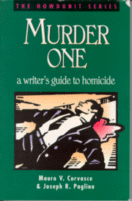Writing Book Reviews
Page One of TwoMaking Money In Technical Writing, by Peter Kent
Arco, Oct., 1997.Trade Paperback, 280 pages.
ISBN: 0028618831.
Ordering information:
Amazon.com.
 This informative book, by freelance technical writer Peter Kent,
takes a welcome dollars and sense approach to what technical writing
is and provides all the information needed to become very successful
in this field. It covers all the bases, including negotiating,
taxes, contracts, incorporating, consulting, working online and lists
of additional resources such as associations, seminars, websites and
other informational outlets. Each section is covered in-depth with
advice on what to do and what not to do as well as advantages and
disadvantages of making a specific decision. For example,
Kent's section on agencies includes advice on how to get work through
agencies, benefits offered by agencies, what to look for in an agency
and also a section on unethical agencies and disadvantages in working
through one. The last chapters of the book provide advice to the
more successful freelancer with specific information on consulting
work, making sales and a chapter titled "Should You Incorporate?"
that details economic advantages and disadvantages on starting your
own corporation.
This informative book, by freelance technical writer Peter Kent,
takes a welcome dollars and sense approach to what technical writing
is and provides all the information needed to become very successful
in this field. It covers all the bases, including negotiating,
taxes, contracts, incorporating, consulting, working online and lists
of additional resources such as associations, seminars, websites and
other informational outlets. Each section is covered in-depth with
advice on what to do and what not to do as well as advantages and
disadvantages of making a specific decision. For example,
Kent's section on agencies includes advice on how to get work through
agencies, benefits offered by agencies, what to look for in an agency
and also a section on unethical agencies and disadvantages in working
through one. The last chapters of the book provide advice to the
more successful freelancer with specific information on consulting
work, making sales and a chapter titled "Should You Incorporate?"
that details economic advantages and disadvantages on starting your
own corporation.
The book can be used by the novice writer looking to break into technical writing or for those already involved in the field who are looking to improve their knowledge and skills and earn a higher income for their work. An exceedingly valuable resource for the serious writer looking to earn money in the potentially lucrative technical writing industry.
Murder One: A Writer's Guide to Homicide, by Mauro V. Coravasce & Joseph R. Paglino
Writer's Digest Books, Sept., 1997.Trade Paperback, 216 pages.
ISBN: 089879773X
Ordering information:
Amazon.com.
 Murder One provides the writer with the background details of
homicides for use in formulating a murder scene in a story or novel.
The book, written by actual investigators, covers all aspects of
murder including the steps taken in a homicide investigation,
weapons that may be used and types of murder from contract murders to
crimes of passion. The book assigns a different chapter to each kind
of murder, including business and financial murders, gang murders,
familial murders, serial murders and many others. The coverage of
the different categories of murder includes motives, methods, case
studies, examples, scenarios and fine details. The book also
provides a very useful glossary with definitions to murder-related
words such as Equivocal Death and Staged Scene.
Murder One provides the writer with the background details of
homicides for use in formulating a murder scene in a story or novel.
The book, written by actual investigators, covers all aspects of
murder including the steps taken in a homicide investigation,
weapons that may be used and types of murder from contract murders to
crimes of passion. The book assigns a different chapter to each kind
of murder, including business and financial murders, gang murders,
familial murders, serial murders and many others. The coverage of
the different categories of murder includes motives, methods, case
studies, examples, scenarios and fine details. The book also
provides a very useful glossary with definitions to murder-related
words such as Equivocal Death and Staged Scene.
The book can be used by mystery writers as a resource to check accuracy, to determine how to finish a murder scene or even as a beginning point to get ideas. An excellent resource that can save many trips to the library.
Click Here For Page 2 of Writing Book Reviews
Return to the January 1998 issue of The IWJ.
More from Writers Write
